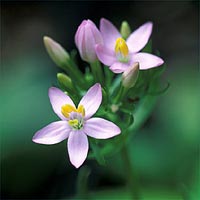Centaury
Uses
Parts Used & Where Grown
This small grassland plant is native to Eurasia. The leaves, stems, and flowers of centaury are used medicinally.
Our proprietary “Star-Rating” system was developed to help you easily understand the amount of scientific support behind each supplement in relation to a specific health condition. While there is no way to predict whether a vitamin, mineral, or herb will successfully treat or prevent associated health conditions, our unique ratings tell you how well these supplements are understood by the medical community, and whether studies have found them to be effective for other people.
For over a decade, our team has combed through thousands of research articles published in reputable journals. To help you make educated decisions, and to better understand controversial or confusing supplements, our medical experts have digested the science into these three easy-to-follow ratings. We hope this provides you with a helpful resource to make informed decisions towards your health and well-being.
3 Stars Reliable and relatively consistent scientific data showing a substantial health benefit.
2 Stars Contradictory, insufficient, or preliminary studies suggesting a health benefit or minimal health benefit.
1 Star For an herb, supported by traditional use but minimal or no scientific evidence. For a supplement, little scientific support.
This supplement has been used in connection with the following health conditions:
| Used for | Why |
|---|---|
|
1 Star
Indigestion, Heartburn, and Low Stomach Acidity
Refer to label instructions
|
Centaury acts as a digestive stimulant and may be helpful for indigestion.
Bitter herbs are thought to stimulate digestive function by increasing saliva production and promoting both stomach acid and digestive enzyme production. As a result, they are particularly used when there is low stomach acid but not in heartburn (where too much stomach acid could initially exacerbate the situation). These herbs literally taste bitter. Some examples of bitter herbs include greater celandine, wormwood, gentian,dandelion, blessed thistle, yarrow, devil’s claw, bitter orange, bitter melon, juniper, andrographis, prickly ash, and .. Bitters are generally taken either by mixing 1–3 ml tincture into water and sipping slowly 10–30 minutes before eating, or by making tea, which is also sipped slowly before eating. |
|
1 Star
Loss of Appetite
Refer to label instructions
|
Centaury contains bitter glycosides that stimulate secretion of stomach acid and digestive enzymes as well as activity of the entire digestive tract.
Centaury contains bitter glycosides that stimulate secretion of stomach acid and digestive enzymes as well as activity of the entire digestive tract. Centaury is recommended by the German Commission E for people with poor appetite and indigestion.
|
Traditional Use (May Not Be Supported by Scientific Studies)
Centaury is one of the mainstays of European folk herbalism as a tonic for the digestive tract.1 It was also used as a general tonic for people who had fevers.
How It Works
How It Works
Centaury contains bitter glycosides that stimulate secretion of stomach acid and digestive enzymes as well as activity of the entire digestive tract.2 Centaury is recommended by the German Commission E for people with poor appetite and indigestion.3 One preliminary animal study showed the herb had anti-inflammatory and fever-lowering effects.4
How to Use It
Centaury is generally taken prior to a meal. A tea is made by adding 1 to 2 teaspoons of the herb to one cup of hot water and allowing it to steep for 15 minutes.5 The tea should be sipped slowly. The bitter taste can be covered up by adding ginger tea. Alternately, capsules can be used in the amount of 1 to 2 grams three times per day before a meal.6
Interactions
Interactions with Supplements, Foods, & Other Compounds
Interactions with Medicines
Side Effects
Side Effects
Centaury could theoretically worsen the conditions of peptic ulcer disease, elevated stomach acid levels, heartburn, gastroesophageal reflux disease, diarrhea, or acute inflammation of the intestinal tract, such as Crohn’s disease, and should be avoided in such cases. Centaury is otherwise safe.7 The safety of centaury in pregnancy and breast-feeding is unknown.
References
1. Weiss RF. Meuss AR, trans. Herbal Medicine. Gothenberg, Sweden: Ab Arcanum and Beaconsfield: Beaconsfield Publishers Ltd, 1988:39-40.
2. Weiss RF. Meuss AR, trans. Herbal Medicine. Gothenberg, Sweden: Ab Arcanum and Beaconsfield: Beaconsfield Publishers Ltd, 1988:39-40.
3. Blumenthal M, Busse WR, Goldberg A, et al, eds. The Complete German Commission E Monographs: Therapeutic Guide to Herbal Medicines. Austin: American Botanical Council and Boston: Integrative Medicine Communications, 1998:106.
4. Berkan T, Üstünes L, Lermioglu F, Özer A. Anti-inflammatory, analgesic and antipyretic effects of an aqueous extract of Erythraea centaurium. Planta Med 1991;57:34-7.
5. Weiss RF. Meuss AR, trans. Herbal Medicine. Gothenberg, Sweden: Ab Arcanum and Beaconsfield: Beaconsfield Publishers Ltd, 1988:39-40.
6. Blumenthal M, Busse WR, Goldberg A, et al, eds. The Complete German Commission E Monographs: Therapeutic Guide to Herbal Medicines. Austin: American Botanical Council and Boston: Integrative Medicine Communications, 1998:106.
7. Blumenthal M, Busse WR, Goldberg A, et al, eds. The Complete German Commission E Monographs: Therapeutic Guide to Herbal Medicines. Austin: American Botanical Council and Boston: Integrative Medicine Communications, 1998:106.
Last Review: 06-03-2015

Copyright © 2024 TraceGains, Inc. All rights reserved.
Learn more about TraceGains, the company.
The information presented by TraceGains is for informational purposes only. It is based on scientific studies (human, animal, or in vitro), clinical experience, or traditional usage as cited in each article. The results reported may not necessarily occur in all individuals. For many of the conditions discussed, treatment with prescription or over the counter medication is also available. Consult your doctor, practitioner, and/or pharmacist for any health problem and before using any supplements or before making any changes in prescribed medications. Information expires December 2024.



